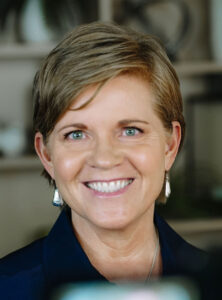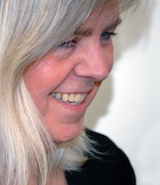
Vol. 21, Issue 4, April 6, 2023
It’s been gratifying in recent years to see our culture move toward diversity and inclusion. Our speaker, Dr. Michelle May, notes, however, that there is one area that gets left out of the conversation, and that is body size. In fact, she notes that in health care, there is a lot of weight stigma and weight bias. This can affect the quality of care and the relationship between clinicians and their patients. Further, employees in the healthcare environment may be negatively affected by weight stigma.
I recently interviewed Dr. May about weight stigma in our culture. She is the award-winning author of the book series, Eat What You Love, Love What You Eat that teaches mindful eating to help individuals resolve mindless and emotional eating and senseless yo-yo dieting to live the vibrant life they crave. She is also the co-author of a recent peer-reviewed article on weight-inclusive care that you can read here.
Dr. Michelle May
A New Paradigm: Weight Inclusivity
“Moving toward weight inclusivity would stop ’othering’ a large percentage of our population,” Dr. May said, “and help them achieve the wellbeing we’re all seeking.”
“Weight bias is the result of our current paradigm,” she continued. “When I’m doing a presentation, that’s where I start.  I’m not there to get in people’s faces, embarrass them, or judge them. What I want them to see is that we all have paradigms about different aspects of our life and everything we think, say, and do is filtered through that paradigm. Until we’re able to see things differently or more clearly, we can’t see where our biases exist. I often share the interesting phenomenon called the Semmelweis Reflex.”
I’m not there to get in people’s faces, embarrass them, or judge them. What I want them to see is that we all have paradigms about different aspects of our life and everything we think, say, and do is filtered through that paradigm. Until we’re able to see things differently or more clearly, we can’t see where our biases exist. I often share the interesting phenomenon called the Semmelweis Reflex.”
She explained that Dr. Semmelweis was a Hungarian pediatrician in the early 1800s. Based on his research, he made the revolutionary recommendation to his colleagues to wash their hands between patients to reduce mortality after childbirth. His colleagues were insulted that he could possibly suggest that gentlemen could be vectors of deadly disease. That became known as the Semmelweis Reflex: rejecting new knowledge when it flies in the face of what we have always thought or believed.
“This phenomenon can cause us to dismiss weight science that contradicts currently held beliefs but that could help us make a shift to better care,” she continued. “Many people are absolutely convinced that losing weight is the most important thing, maybe besides quitting smoking, that someone can do for their health. But in fact, the literature doesn’t support that weight and health are as closely linked as most people believe.”
There is a problem of confusing correlation and causation in much of the weight-based literature.
“Clinicians understand this where other issues are concerned. Let me give you an example of correlation and causation. There was a study showing that bald men have a higher rate of heart disease. Do you think baldness causes heart disease? Or that we should do hair transplants or recommend Rogaine to prevent heart disease? Of course not! It’s clear this is a correlation and there are likely other factors that cause both baldness and heart disease, right?
“BMI is correlated with certain conditions, but that doesn’t prove causation. Other factors may partially or fully explain the link, such as social determinants of health, exercise, nutrition, insulin resistance, and weight stigma.”
In addition, Dr. May explained that no weight loss initiatives to date have produced sustainable changes in weight or health for the majority of participants. “Weight is not a behavior! Our focus should be on cultivating sustainable lifestyle changes.
“Further, a weight-centric focus can be harmful because it increases weight stigma, weight cycling, and disordered eating.”
Now that we’re becoming aware of some of the challenges to our thinking on the topic of weight and health, what are some of the possible solutions? Stay tuned for our next issue when we continue this interview and Dr. May explores how to “Make the shift from a weight-centered to a weight-inclusive approach.”
————————————–
Michelle May, M.D., CSP, empowers audiences to take charge of their lives and their well-being. Her authenticity and passion for mindful eating and vibrant living stem from her own personal struggle with food and body image. After years of ineffective yo-yo dieting, she developed a mindful, non-diet approach to food, movement, and self-care. With personal experience and professional expertise, Dr. May inspires new ways of thinking and leaves your audience with a clear path for implementing vibrant well-being in their personal and professional lives.
Dr. May is the award-winning author of the book series, Eat What You Love, Love What You Eat that teaches mindful eating to help individuals resolve mindless and emotional eating and senseless yo-yo dieting to live the vibrant life they crave.. She is an Associate Professor at Arizona State University where she teaches Mindful Eating. She is a Certified Speaking Professional (CSP), the highest earned designation from the National Speakers Association.
Ready to break some barriers and challenge thinking about weight in your organization? To bring Dr. May’s expertise to your community, give me a call at 503-699-5031, or email me at <barbara@speakwellbeing.com>
Chomping at the Bit for Spring
 I don’t know how it is in other parts of the country, but Spring is holding out on us here in the Northwest. Since moving here 25 years ago, I’ve always enjoyed blooming crocuses and daffodils in late February — lifting my weather weary spirits. Not this year.
I don’t know how it is in other parts of the country, but Spring is holding out on us here in the Northwest. Since moving here 25 years ago, I’ve always enjoyed blooming crocuses and daffodils in late February — lifting my weather weary spirits. Not this year.
It’s April, for heaven’s sake, and a few daffodils have only been blooming for about two weeks — and many are still just emerging from the ground. My camellias that we bought blooming a year ago January, are still just buds. Thank goodness for the hellebores that did show up just a little late, and have stayed bright, perky, and upright through unseasonal snow and cold. They are amazingly sturdy.
Meantime, I’m itching to break out the barbecue and get my hands in the soil. The calendar tells me that summer will come, and I’ll just have to keep believing.
Until next time, take care of yourself for your well being and those you love.
Yours truly,
Barbara

The Speak Well Being Group is a specialized speakers bureau, focusing on health and wellness for all types of organizations that want to foster health and well being for their employees, members, clients, and in their communities.
Our speakers are hand-selected. They are not only experts in their fields; they connect with their audiences while bringing them life-changing information, smiles of recognition, and ultimately a sense of well being and hope.
Finding the perfect keynote speaker for your special event or conference is my personal passion, not just once, but year after year. It brings me great joy to know that your audience was delighted and moved by the speaker we selected together. I’m committed to making the process easy, pleasant and fun.
